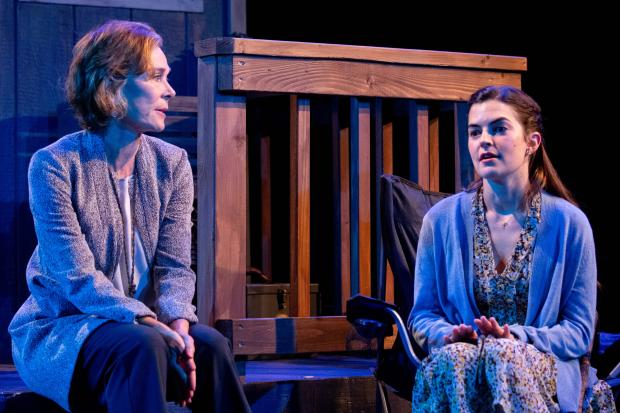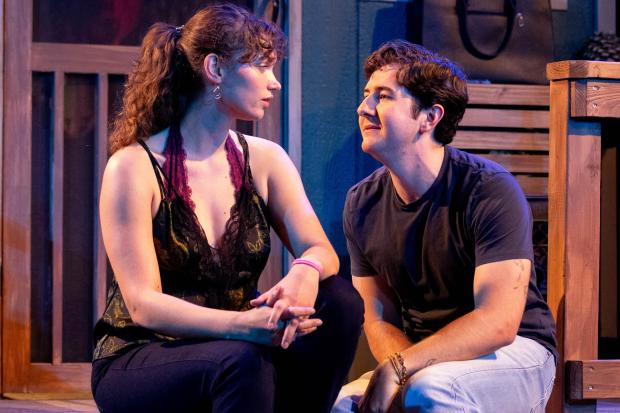With a Sunday matinee plus Monday night performance, this is the last week for serious lovers of drama to see Rogue Machine’s repeatedly extended Heroes of the Fourth Turning at the Matrix Theatre. Playwright Will Arbery’s unique play first produced in 2019 is like Dogma – Kevin Smith’s 1999 philosophical excursion into obscure church doctrine – meets The Turner Diaries, a 1978 fictitious account of a racist rightwing insurrection (Oklahoma City bomber Timothy McVeigh was inspired by and carried a copy of this terrorist novel).
Set during the Trump administration in 2017 only a week after the Charlottesville alt right race riots, in Arbery’s semi-autobiographical Heroes, four childhood friends and classmates, now in their thirties, who’d attended the conservative Transfiguration Catholic college way down yonder Wyoming way hold a reunion to celebrate the promotion of their professor Gina (Roxanne Hart, who was Tony nominated for her role in Passion on Broadway) to the presidency of their religious school. The party takes place at the backwoods cabin (rendered by Roge Machine’s resident scenic designer Stephanie Kerley Schwartz; the rest of the stage is mostly bare) of Justin (Stephen Tyler Howell), a reticent combat veteran who is cut in the mold of the John Wayne-like strong silent type. The action opens with what may be a sly reference to the 1978 Vietnam War movie The Deer Hunter, as the ex-sniper guns down a deer but then, after dragging the corpse onto his porch, paralyzed by conscience, the macho gunslinger is unable to gut it. From time-to-time Justin tries to (Lady Macbeth-like) wipe the bloodstains away during the rest of this two-hour-long, one-acter.
Once the revelry gets underway, there is much drinking. Samuel Garnett turns in a bravura performance as Kevin, who is drunk throughout the entire play. Garnett is the best drunkard I’ve seen depicted since Frank Fontaine as Crazy Guggenheim on TV’s The Jackie Gleason Show and Lee Marvin as Kid Shelleen in the 1965 movie Cat Ballou. Gina’s daughter Emily (Emily James, HBO’s Barry) has some sort of debilitating illness that has her perpetually wracked with pain and hobbling around with a cane – or, is her crippling disability all in her head?
Teresa (played by an evangelical Evangeline Edwards) is the most aggressive of the former schoolmates. She has moved from Wyoming’s boondocks to the big city, becoming a full-blown culture warrior, waging war from Brooklyn, firing broadsides on her podcasts against the Left, which this anti-abortion zealot argues is out to destroy America. An acolyte of rightwing strategist Steve Bannon, Teresa is inspired by William Strauss and Neil Howe’s The Fourth Turning: An American Prophecy - What the Cycles of History Tell Us About America’s Next Rendezvous with Destiny, the 1997 tome that Arbery references in his drama’s title. Like characters in Smith’s Dogma, Teresa is given to recitations of reactionary doctrinaire mumbo jumbo, including insisting upon elaborating on the various historic “cycles” that Strauss and Howe cite in their so-called “American Prophecy.”
The dramatis personae’s musings are actually quite intriguing, especially for those on the Left, to hear these characters banter back and forth and “elucidate” their bizarre conservative notions that they wish to impose on the rest of us (you know, the majority). They truly have some of the finest minds of the 12th century, you know, the kind of dangerous superstitious fanatics filled with inquisitorial impulses who would have denounced the Renaissance – let alone the Age of Reason – as “woke” and launched auto-da-fés to burn the infidels.
When Gina – or Dr. Preston, as I believe Teresa calls her – finally arrives (about two thirds of the way through the play) at the party supposedly thrown to celebrate her coronation as college president, the fireworks really begin. The former “Goldwater Girl” Gina (the 1964 presidential candidate’s slogan was: “In your heart, you know he’s right”), an old school conservative of the John Birch Society, Pat Buchanan variety, clashes with Teresa, a more up-to-date Trump era neo-fascist. But are the two factions really so different?
Perhaps in degree, but not in kind. Consider how Sen. John McCain is lionized nowadays for crossing the aisle and so on. It’s true that McCain has a somewhat mixed record, but he was the Will Rogers of warfare, an unmitigated war monger who never met an armed conflict he didn’t like and who, during the 2008 presidential campaign, unleashed the truly demented Sarah Palin on the national arena, thereby setting the stage for the MAGA madness to come. McCain may have been known as a “maverick,” but he himself eschewed that characterization and by the way, the former POW given to public outbursts of anger was widely rumored to be mad. (Meanwhile, back at the review:)
Speaking of which, what makes Arbry’s characters tick? Fueled by alcohol, some of them heretically question the Christian nationalist dogma that they wear like mental strait jackets. The drunken Kevin wonders aloud why Catholicism always has to be wrapped up with conservatism? After her mother exits, Emily commits an act of heresy, pondering whether god even exists (note to reader: no, he/she/it doesn’t, but carry on), questions anti-abortion fanaticism and starts cursing like a sailor. After getting her ya-yas out, Emily is suddenly able to walk without her cane and observes that she “feel[s] better.”
Teresa reveals her true colors with cruel, cutting remarks intended to emasculate Kevin, who has always lusted after the not-so pristine rightwing firebrand with her goody two-shoes virginal persona.
What’s truly beneath all of the reactionary and “Christian” blather? In the Playbill’s “Playwright’s Note:” Arbery – whose work includes HBO’s Succession and Irma Vep – confesses: “The desire to fuse with other people has been a major theme in my work…”
With the possible exception of Gina, who has repeatedly experienced childbirth, the characters all have a stunted love life. The sexual repression inherent in the medieval doctrine they’ve been brainwashed with has thwarted their ability to love, to form human connections. In a rare moment of vulnerability, the nasty Teresa admits to insecurity, not knowing whether or not she can love and be loved.
At one point in the play, Justin confides to Emily that he wants to tell her something, but the soused Kevin stumbles back to the cabin from the woods, where he had been relieving himself. Later, when Emily and Justin are alone again, he reveals what he’s been trying to tell Emily. Does he pop the question? Let’s just say his announcement expresses the play’s theme of the inability of these people, as psychically crippled as Emily is physically handicapped, to form full human connections.
In addition to the gunshot fired at the start of the play, there are a number of annoying loud noises (audience beware), which Justin tries to explain away to his guests as technical difficulties of the cabin’s generator (Heroes’ “unsound” sound design is by Christopher Moscatiello). But it turns out that this is untrue, and the searing sound has another origin. Is it the malevolence of sheer evil? Or a metaphor for something else that is afflicting these ideologically, psychologically troubled characters unable to connect fully with one another, let alone the world-at-large? Inquiring minds want to know!
Rogue Machine’s Los Angeles premiere of Heroes is of a piece with the edgy oeuvre of this company created in 2008 “to be a theatre of ideas and imagination, a theatre which mirrors and examines contemporary culture, a theatre which nurtures contemporary playwrights, and a theatre whose work continually engages the community and creates a dialogue which resonates after the curtain closes,” according to its lofty mission statement. Artistic Director Guillermo Cienfuegos tautly directs his ensemble, as the gifted helmer has deftly done with many other stage productions, such as Rogue’s Dutch Masters and Pacific Resident Theatre’s Rhinoceros (which, BTW, is not about what Teresa would call “Republicans In Name Only,” but rather an absurdist play by Eugene Ionesco).
Out of Arbery’s (you have my empathy, buddy) life experiences, Heroes sheds light on the irrational mindset of “Christian conservatism,” which the dramatist describes as “a secret and shrewd force in our country.” It’s important to pay attention to this movement, which not only seems to have little awareness of what Jesus actually stood for (he never, ever once mentioned abortion but repeatedly excoriated the rich, don’t get me started!), but is dangerous and includes adherents who – like Justin –are armed. It seems that at the core, Christian nationalists’ conception of Christianity is sexual repression.
While it is indeed interesting and educational (not to mention eyebrow-raising) to hear the different strains of this worldview articulated, Heroes would have been truly heroic if it also featured a truly opposing, dare I say it?, “woke” worldview. For instance, an advocate of liberation theology or a socialist arguing that America’s massive inequality, with wealth concentrated in fewer and fewer hands, is what is really threatening the USA – not women’s rights to control their own bodies.
Nevertheless, Heroes is for ticket buyers interested in politics, religion and philosophy, as well as for more adventurous theatergoers who just enjoy experiencing something off the beaten track with great acting and writing. But to quote Badfinger: “If you want it, here it is, come and get it, but you better hurry as it’s going fast.”
Rogue Machine’s Heroes of the Fourth Turning is being performed Monday, Thursday, Friday and Saturday at 8:00 p.m. and Sunday at 3:00 p.m. through Oct. 22 at the Matrix Theatre, 7657 Melrose Avenue, L.A., California, 90048. For reservations call (855)585-5185 or https://roguemachine.ludus.com/index.php?show_id=200438840.



